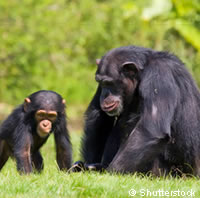Primate intelligence overestimated says new research
New research published in the journal Public Library of Science (PLoS) Computational Biology says that primates may not be as intelligent as was previously thought and that their grooming rituals are not necessarily a symbol of rational behaviour. A research team at the University of Groningen in the Netherlands has developed a computer model called DomWorld which can analyse primate behaviour. The team says the model proves that there is one basic rule that governs primate grooming patterns - a primate will groom another if it fears losing to it in a fight. Scientists have previously assumed that primates' intricate grooming rituals, in which animals groom one another after a fight and trade grooming for help in fights, is a sign of conscious and intelligent behaviour. The new research says that the truth is simpler - the elaborate behaviour involving reconciliation grooming is based on the animals' fear of losing a fight. Professor Charlotte Hemelrijk of Groningen University explained, 'Reconciliation and exchange behaviour are not necessarily conscious behaviour - simply a consequence of rank and of which primates are in the vicinity of the primate that wants to groom.' Primates have always been regarded by scientists as highly intelligent creatures, second only to humans. Consequently they have been the subject of much intelligence testing. 'Primates are intelligent, but their intelligence is overestimated,' said Professor Hemelrijk. 'Primates are assumed to use their intelligence continually and to be very calculating. They're supposed to reconcile after fights and to do so preferably with partners that could mean a lot to them.' Such behaviour would mean that primates would have to be aware of who they last fought with and keep track of a complicated series of thoughts about who is 'owed' a grooming repayment. However, according to Professor Hemelrijk, it is not so complicated. 'Our computer model GrooFiWorld shows that complex calculating behaviour is completely unnecessary,' she said. 'We can add the simple rule to the existing DomWorld model - an individual will begin grooming another when it expects to lose to upon attacking the other. This in itself leads to many of the complex patterns of friendly behaviour observed in real primates.' The research results do not mean that primate are not capable of exhibiting intelligent behaviour, but simply that further research is needed to determine if the type of primate behaviour observed is conscious. 'The resemblance of patterns of friendly behaviour in our model to those in reality means that more evidence is needed to be able to draw the conclusion that friendly relationships are based on human, calculating considerations,' commented Professor Hemelrijk. 'Our model is a 'null model' providing simple explanations which are especially useful for further research into friendly behaviour in primates, in particular into that of macaques.'
Countries
Netherlands



